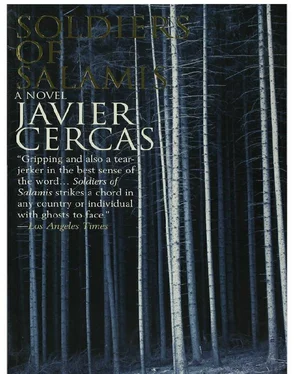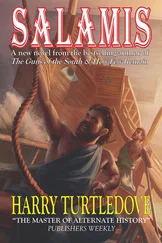Miralles was recruited in the autumn of 1936, a few months after the beginning of the war in Spain and after he had just turned eighteen; at the beginning of 1937, after some hasty military training, he was placed in the First Mixed Brigade of the Army of the Republic, which was under the command of Enrique Líster. Líster, who'd been commander of the Antifascist Workers' Militias and of the Fifth Regiment, was already a living legend. The Fifth Regiment had just been disbanded, and the majority of Miralles' battalion comrades had fought in its ranks and had been decisive, a few months earlier in November, in stopping Franco's troops at the gates of Madrid. Before the war Miralles worked as an apprentice lathe operator; he knew nothing about politics: his parents were very poor and never discussed such things; nor did his friends. Nevertheless, as soon as he arrived at the front, he became a Communist: the fact that his comrades and commanders and Líster were Communists undoubtedly influenced his decision too; perhaps even more so did his immediate certainty that the Communists were the only ones who were really ready to stand firm and win the war.
'I guess he was a bit wild,' Bolaño remembered Miralles saying one night, talking about Líster, under whose orders he'd spent the entire war. 'But he loved his men and he was very brave, very Spanish. A guy with real guts.'
'A thoroughbred Spanish brute,' Bolaño quoted, without telling Miralles he was quoting Cesar Vallejo, about whom he was writing a quirky novel at the time.
Miralles laughed.
'Exactly,' he agreed. 'Afterwards I read a lot about him, against him really. Most of it false, from what I know. I suppose he was wrong about a lot of things, but he got a lot of things right too, don't you think?'
In the early days of the war Miralles had been in sympathy with the anarchists, not so much for their chaotic ideas or for their urge to revolution, but more because they were the first to take to the streets and fight against fascism. Nevertheless, as the struggle advanced and the anarchists spread chaos in the rearguard, that sympathy disappeared: like all Communists — and undoubtedly this also helped push him towards them Miralles understood that the first thing was to win the war, then there would be time for revolution. So, in the summer of 1937 when the 11th Division, to which he belonged, liquidated the Aragonese anarchist collectives on Líster's orders, Miralles considered the operation brutal, but not unjustified. Later he fought in Belchite, in Teruel, at the Ebro and, when the front collapsed, Miralles retreated with the army towards Catalonia and at the beginning of 1939 crossed the French border together with the other 450,000 Spaniards who did so in the final days of the war. On the other side was the Argelès concentration camp, which was really just a bare, immense beach surrounded by a double ring of barbed wire; there were no huts, and no protection from the savage February cold, and no sanitation, just a quagmire, where in subhuman conditions, with women and old folks and children sleeping on the sand dappled with snow and frost, and men wandering around, dumbfounded by the burden of desperation and the rancour of defeat, 80,000 Spanish fugitives waited for the hell to end.
'They called them concentration camps,' Miralles used to say. 'But they were nothing but death-traps.'
And so, a few weeks after arriving at Argeles, when the enlistment flags of the French Foreign Legion appeared in the camp, Miralles signed up without a second thought. That was how he ended up in the Maghreb, some part of the Maghreb, maybe Tunisia or Algeria, Bolaño didn't quite remember. The beginning of the World War caught him out there. France fell into the hands of the Germans in June of 1940, and the majority of the French authorities in the Maghreb took the side of the puppet government at Vichy. But Leclerc, General Jacques Phillippe Leclerc, was also in the Maghreb. Leclerc refused to accept orders from Vichy and began to recruit as many people as he could, with the reckless idea of getting them to cross half of Africa under his command and reach some French overseas possession that accepted the authority of De Gaulle, who like him, though from London, had rebelled against Petain in the name of Free France.
'Fuck, Javier!' Reclining in an armchair in the bar of the Carlemany, Bolaño looked at me mockingly or incredulous through the thick lenses of his glasses and smoke of his Ducados. 'Miralles spent his whole life cursing Leclerc, and also himself for having listened to Leclerc. Neither he nor any of the other outcasts Leclerc took for suckers had the slightest idea of where they were heading. It was a journey of several thousand kilometres across the desert, pure hell, and in much worse conditions than Miralles had left behind in Argeles and with hardly any provisions. Paris-Dakar was a joke, a fucking little Sunday stroll in comparison! It'd take real balls to do a thing like that!'
Nevertheless, there were Miralles and his bunch of deluded volunteers urgently recruited by Leclerc's ludicrous proselytism, who, after several months of suicidal countermarches through the desert, arrived in the province of Chad, in French Equatorial Africa, where they finally made contact with De Gaulle's people. A short time after getting to Chad, together with an English detachment from Cairo and in the company of five other men from the Foreign Legion under the command of Colonel D'Ornano, Commander-in-Chief of the French forces in Chad, Miralles took part in the attack on the Italian oasis of Murzuk, in south-western Libya. The six members of the French patrol were in theory volunteers; in reality Miralles would never have participated in that raid had it not been for the fact that, since no one in his company volunteered for it, they drew lots and Miralles ended up losing. Miralles' patrol was symbolic more than anything, because after the fall of France, it was the first time a French contingent took part in an act of war against the Axis powers.
'Just imagine, Javier,' said Bolaño, looking slightly perplexed, as if holding back laughter, and as if he himself were discovering the story (or the meaning of the story) as he told it. 'All of Europe dominated by the Nazis, and there in the back of beyond, without anyone knowing it, these four fucking Moors, a fucking black guy and this bastard of a Spaniard who made up D'Ornano's patrol raising the flag of freedom for the first time in months. Fucking incredible! And there's Miralles, shafted and shit out of luck and probably with no idea what he's doing there. But there he was.'
Colonel D'Ornano fell at Murzuk. His post in command of the forces in Chad was covered by Leclerc, who, spurred on by the success at Murzuk, immediately launched an attack against the oasis of Koufra the most important of the Libyan desert, and also in Italian hands — with a handful of volunteers from the Foreign Legion and a handful of natives, with very few weapons and very little transport, and on 1 March 1941, after another march of more than a thousand kilometres across the desert, Leclerc and his men took Koufra. And there, naturally, was Miralles. Back in Chad, Miralles enjoyed his first weeks of rest in years, and at some point various deceptive signs led him to imagine that, after the heroic achievements of Murzuk and Koufra, the war was going to keep well away from him and his comrades for some time. That was when Leclerc had his second brilliant idea in a very short time. Convinced, and rightly so, that the war was at stake in North Africa, where Montgomery's Eighth Army was fighting against the German Afrika-Korps, he decided to try to join the English troops, carrying out the reverse of the march — from the Maghreb to Chad — that they'd carried out months earlier. Other Allied units executed the same or a similar operation at the time, but Leclerc was entirely lacking any infrastructure, so Miralles and the 3,200 men he'd managed to gather by then had to cross the thousands of kilometres of merciless desert that separated them from Tripoli once again, by foot, and in even more precarious conditions than the first time, arriving finally in January 1943, just when Rommel's troops had been expelled from the city by Montgomery's Eighth Army. Leclerc's column spent the rest of the African campaign with that corps, so Miralles fought the Germans in the offensive against the Mareth line, and later the Italians in Gabes and Sfax.
Читать дальше












